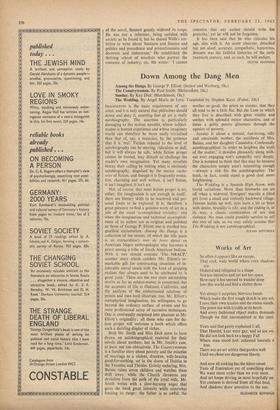Down Among the , Dang Men IMAGINATION is the basic requirement
of any artist, and it is only natural that philistines should detest and deny it, asserting that all art is really autobiography. The assertion is particularly damaging to the serious novelist, whose subject- matter is human experience and whose imaginary world can therefore be more easily trivialised than that of, say, a musician, by the pretence that it is 'real.' Fiction reduced to the level of autobiography can be moving, ridiculous or dull, but it will always be safe, while fiction proper cannot be trusted, may disturb or challenge the reader's own imagination. Yet many novelists betray their calling by writing what is obviously autobiography, disguised by the merest cache- sexe of fiction, and though it is frequently evoca- tive, charming and well written, it isn't fiction, it isn't imagined, it isn't art. Not, of course, that most fiction proper is art, either, for imagination is not enough in itself: there are literary skills to be mastered and per- sonal limits to be explored. It is, therefore, a great pleasure to find a genuine work of art in a pile of the usual `accomplished triviality,' and when the imagination and technical accomplish- ment of its author are as original and polished as those of George P. Elliott one is startled into gratified exclamation. Among the Dangs is a collection of ten stories, of which the title piece is an extraordinary tour de force about an American Negro anthropologist who becomes a priest among a tribe of South American Indians. With it one should consider 'The NR ACP,' another story which exhibits Mr. Elliott's re- markable gift for constructing situations of in- tolerable moral strain with the kind of gripping realism that always used to be attributed to 'a good yarn.' These are the two most astonishing stories as far as subject-matter is concerned, but the accounts of life in Oakland, California, and the analyses of the embarrassed relations of priests and men both 'illustrate, too, Mr. Elliott's metaphysical imagination, his willingness to go beyond the ordinary surface of events and his most professional array of narrative techniques. One is continually surprised into pleasure at Mr. Elliott's originality: all those who care for fic- tion proper will welcome a book which offers such a dazzling display of riches. Both Mr. Smith and Miss Dick seem to have drawn on autobiographical material for their novels about mothers, but in Mr. Smith's case, at least, not too obtrusively. The Countrywoman is a familiar story about poverty and the miseries of marriage to a violent, drunken, wife-beating good-for-nothing, set in the slums of Dublin in the Twenties and Thirties. Grimly enduring, Mrs. Baines raises seven children and watches them drift away, while the Church threatens any deviation from the path of the loyal wife. Mr. Smith writes with a slow-burning anger that gives the book great intensity while somewhat limiting its range: the father is so awful, the mother so good, the priest so sinister, that they all tend to be a little flat. But the Lane in which they live is described with great vitality and seethes with splendid minor characters, and at times a gritty poetry glimmers through the squalor of poverty. Sunday is about a sensual, fun-loving, silly the antithesis and unsuitable mother, esis of Mrs. Baines, and her daughter Cassandra. Confessedly autobiographical `in order to heighten the truth dawdles s of the matter,' it wdles pleasantly along with- out ever engaging one's sympathy very deeply. One is tempted to think that this may be because the characters simply aren't interesting enough —always a risk for the autobiographer. The truth, in fact, could stand a good deal more heightening. The Wedding is a Spanish High Noon, with torrid variations. More than fireworks are set off when a widowed 'foreigner' marries a jilted girl from a small and violently backward village. Tension builds up well, eyes burn a lot or brim with desire, brutality is rife, and the ending is, in its way, a classic combination of sex and violence. No man could possibly survive to tell this sort of tale, so we may safely assume that The Wedding is not autobiographical.
JULIAN MITCHELL


































 Previous page
Previous page